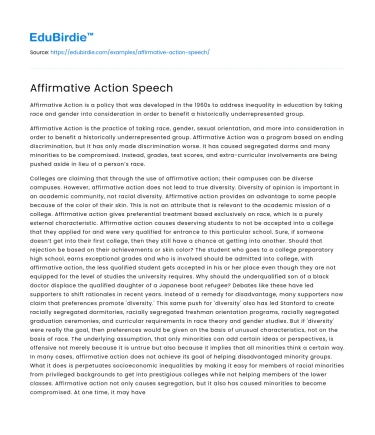Affirmative Action is a policy that was developed in the 1960s to address inequality in education by taking race and gender into consideration in order to benefit a historically underrepresented group.
Affirmative Action is the practice of taking race, gender, sexual orientation, and more into consideration in order to benefit a historically underrepresented group. Affirmative Action was a program based on ending discrimination, but it has only made discrimination worse. It has caused segregated dorms and many minorities to be compromised. Instead, grades, test scores, and extra-curricular involvements are being pushed aside in lieu of a person’s race.
Save your time!
We can take care of your essay
- Proper editing and formatting
- Free revision, title page, and bibliography
- Flexible prices and money-back guarantee
Colleges are claiming that through the use of affirmative action; their campuses can be diverse campuses. However, affirmative action does not lead to true diversity. Diversity of opinion is important in an academic community, not racial diversity. Affirmative action provides an advantage to some people because of the color of their skin. This is not an attribute that is relevant to the academic mission of a college. Affirmative action gives preferential treatment based exclusively on race, which is a purely external characteristic. Affirmative action causes deserving students to not be accepted into a college that they applied for and were very qualified for entrance to this particular school. Sure, if someone doesn’t get into their first college, then they still have a chance at getting into another. Should that rejection be based on their achievements or skin color? The student who goes to a college preparatory high school, earns exceptional grades and who is involved should be admitted into college, with affirmative action, the less qualified student gets accepted in his or her place even though they are not equipped for the level of studies the university requires. Why should the underqualified son of a black doctor displace the qualified daughter of a Japanese boat refugee? Debates like these have led supporters to shift rationales in recent years. Instead of a remedy for disadvantage, many supporters now claim that preferences promote 'diversity.' This same push for 'diversity' also has led Stanford to create racially segregated dormitories, racially segregated freshman orientation programs, racially segregated graduation ceremonies, and curricular requirements in race theory and gender studies. But if 'diversity' were really the goal, then preferences would be given on the basis of unusual characteristics, not on the basis of race. The underlying assumption, that only minorities can add certain ideas or perspectives, is offensive not merely because it is untrue but also because it implies that all minorities think a certain way. In many cases, affirmative action does not achieve its goal of helping disadvantaged minority groups. What it does is perpetuates socioeconomic inequalities by making it easy for members of racial minorities from privileged backgrounds to get into prestigious colleges while not helping members of the lower classes. Affirmative action not only causes segregation, but it also has caused minorities to become compromised. At one time, it may have lessened the severity of discrimination, but now there is no need for it because affirmative action is making discrimination worse. It is unfair to judge applicants on anything other than their merits. There are numerous factors that a college should take into account when considering applicants' grades, test scores, and extra-curricular activities. An applicant’s race is not a legitimate factor to take into consideration because it is outside of the student’s control. It is impossible for a college to consider every aspect of a student’s background when making decisions on whom to admit. Why focus on race when there are so many other things that differentiate students from one another?
Supporters of affirmative action may argue that it helps the economically disadvantaged. Students who are too poor to even consider college can now have a chance for admittance into some competitive colleges. However, studies have shown that “…preferences primarily benefit applicants from middle- and upper-class backgrounds” (Thomas Sowell of the Hoover Institution 1). It is a noble thought to desire in assisting the poor. If this is truly the goal of affirmative action, then the color of one’s skin should not even be a consideration. Income and lifestyles, such as single parenting or large families, should be. If we do eliminate racial and ethnic preferences in college admission, however, we should not ignore the underlying problems that leave many more black and Hispanic students ill-prepared to compete at our best universities. Instead of insisting on racial and ethnic double standards in college admissions, civil-rights groups ought to be more focused on what goes on in elementary and secondary schools across the country. The quality of education in our inner cities is appalling and shows little sign of improvement. Yet the same groups that advocate preferential admission policies at universities and colleges oppose all efforts to provide poor black and Hispanic students the opportunity to attend private or religious schools through vouchers or tax credits.
Colleges should not continue using Affirmative Action. Affirmative action may have been implemented over twenty-five years ago to promote diversity but instead has actually kept discrimination going strong. Affirmative action denies a person who deserves to go to their first pick college and allows a less qualified person to go because of their race, and not their accomplishments.






 Stuck on your essay?
Stuck on your essay?

